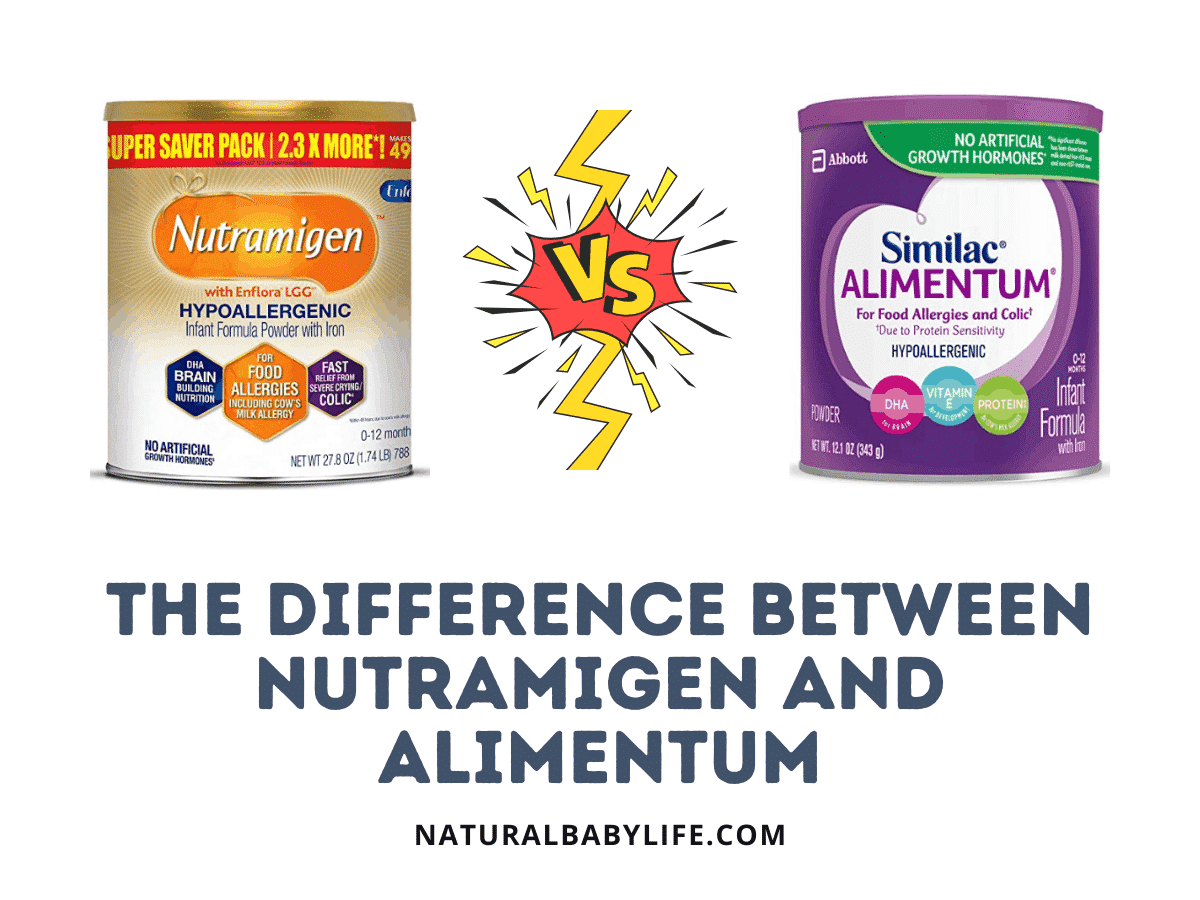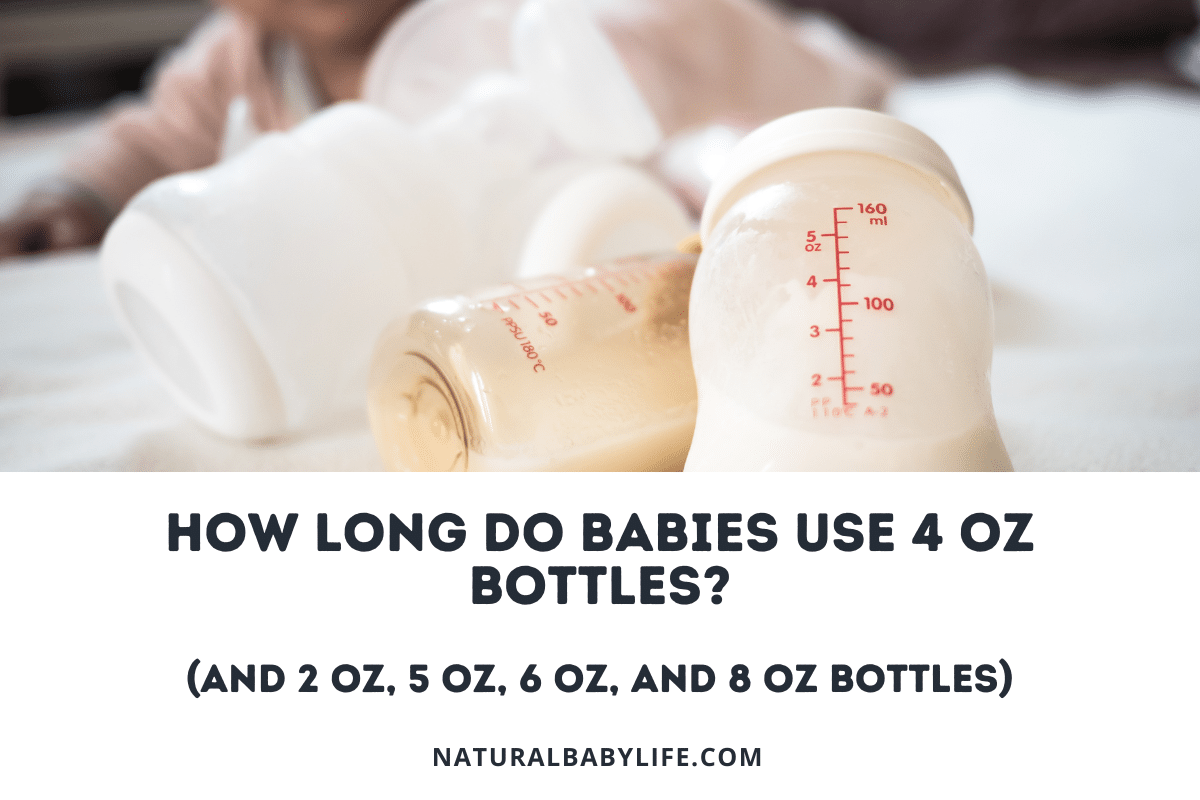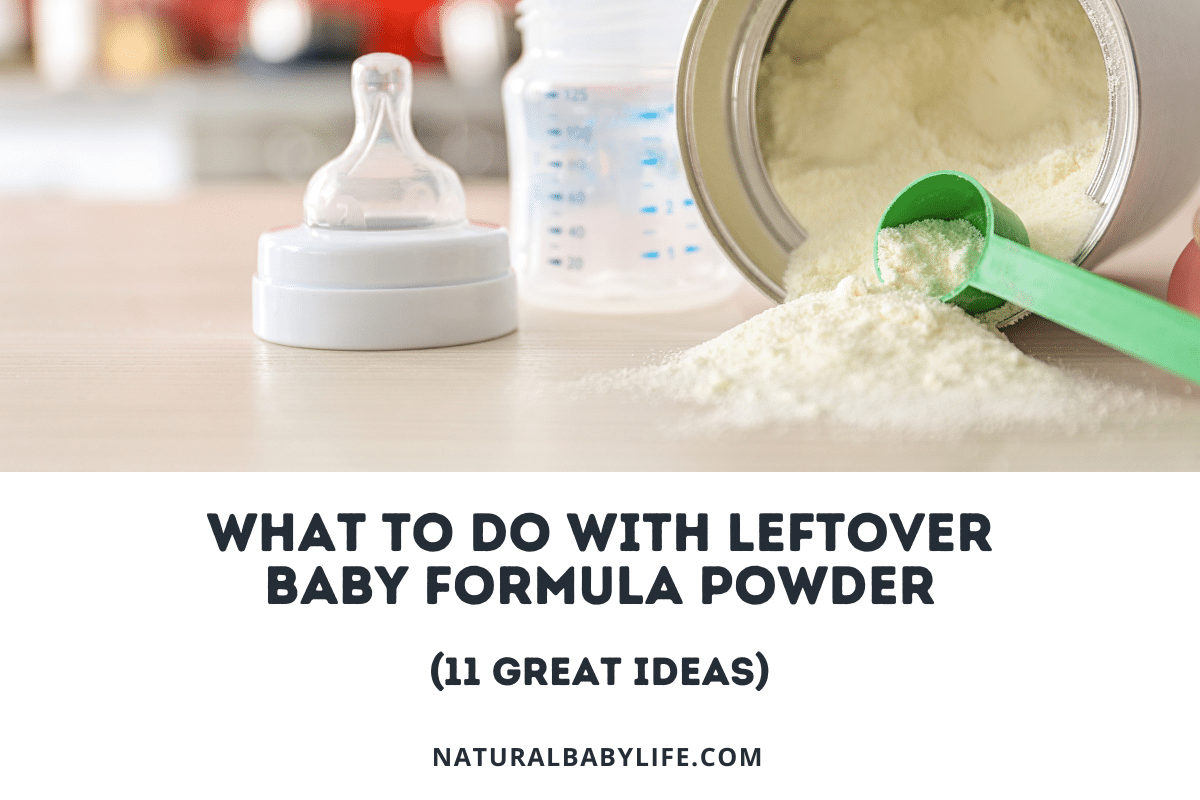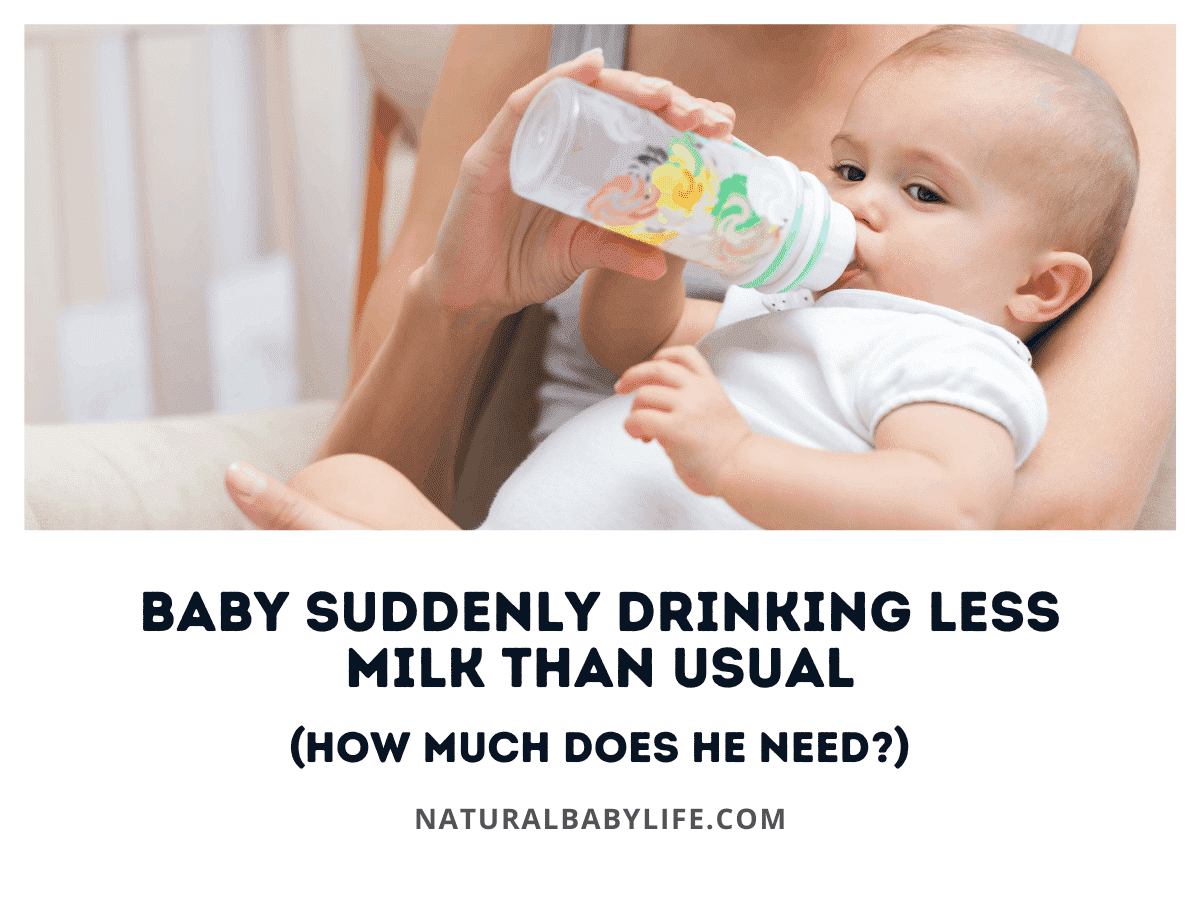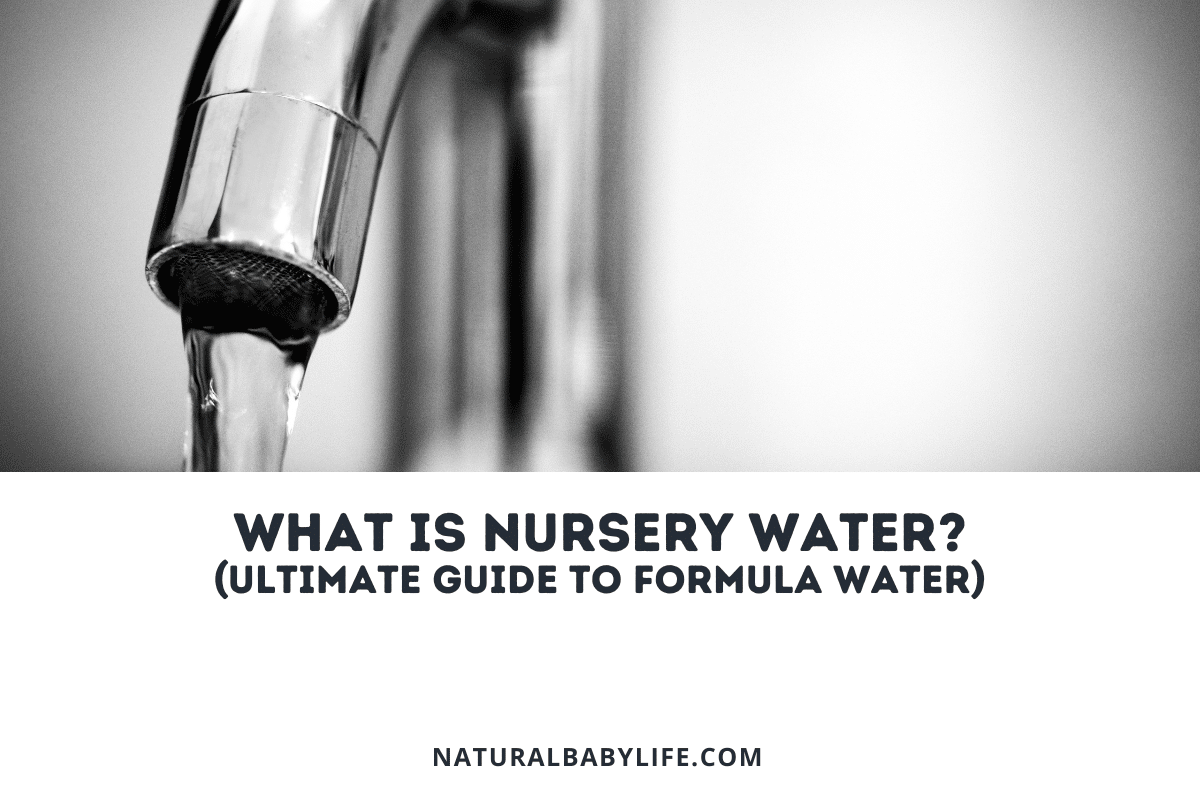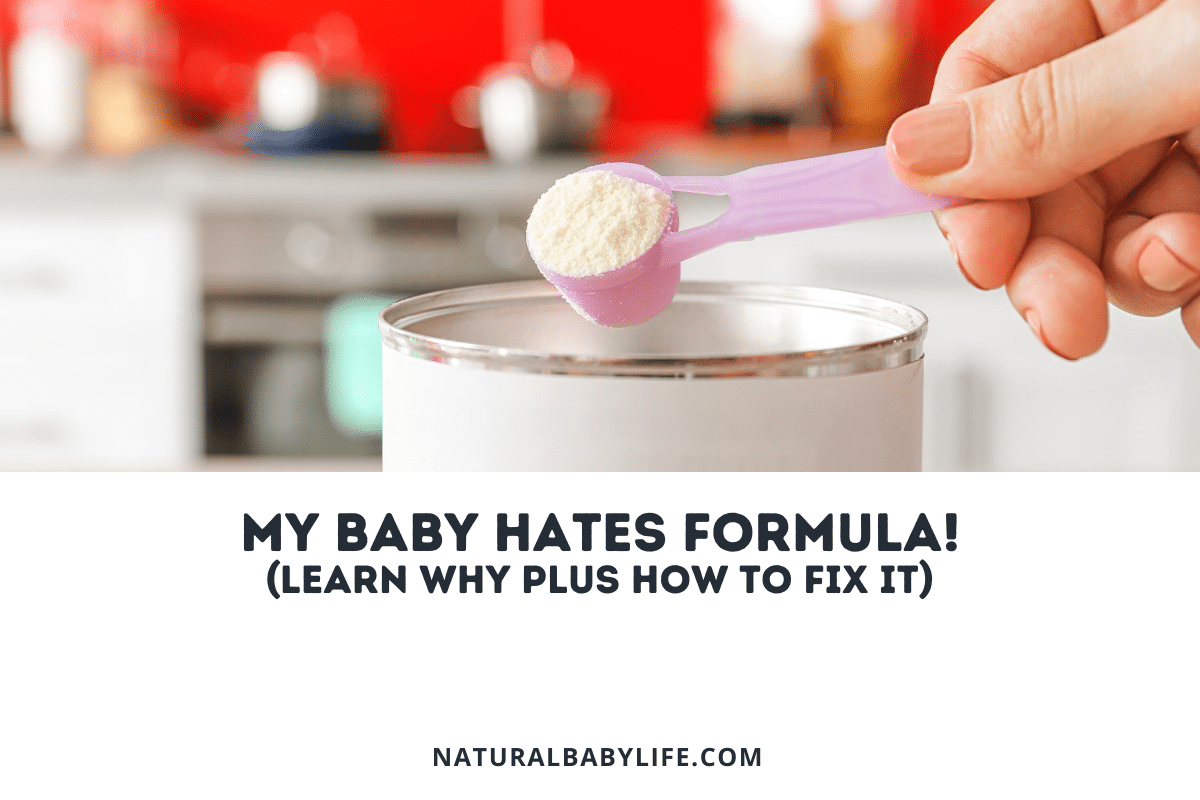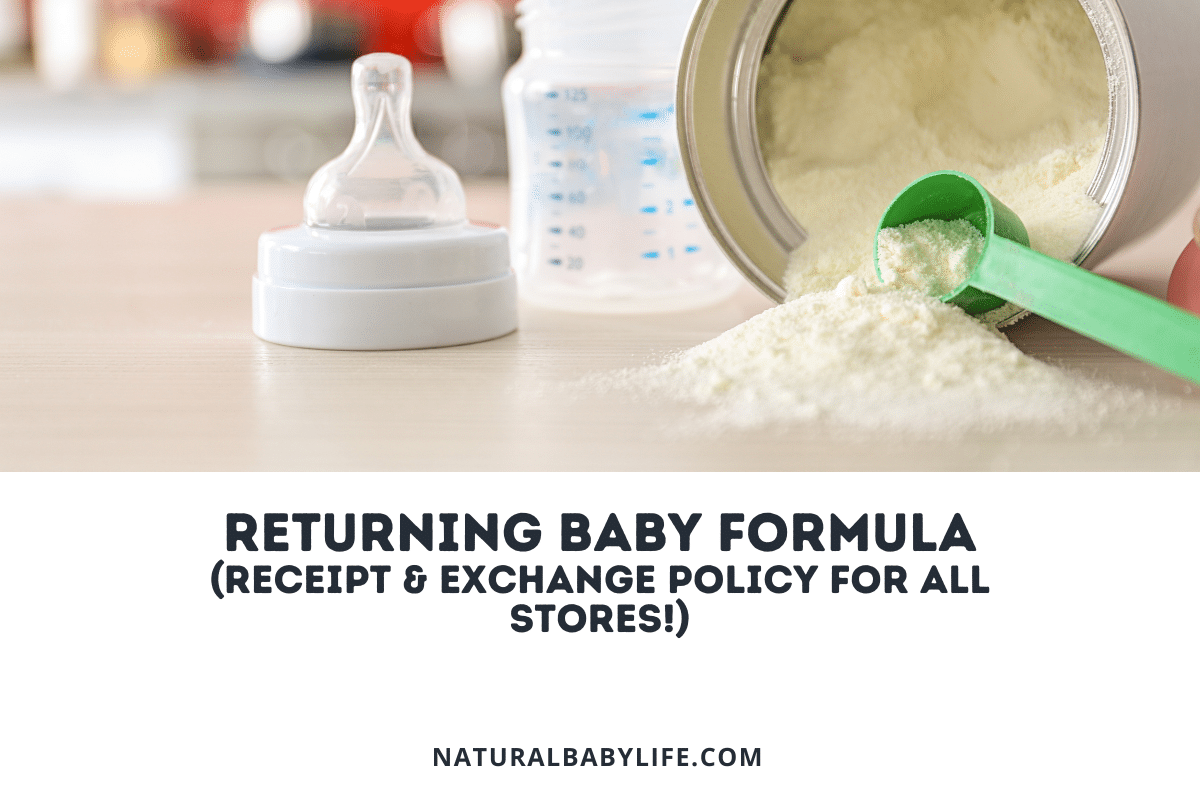It is estimated that almost 10 percent of all babies have some form of food sensitivity or allergy that requires them to eat special formula. If you are trying to decide the difference between Enfamil’s Nutramigen and Similac’s Alimentum then you are in the right place!
Enfamil’s Nutramigen is a better formula than Similac’s Alimentum based on ingredients, cost, features, availability, and parent reviews. Nutramigen is nutritionally complete with Omega 3 DHA and ARA, and LGG probiotics while being lactose and sucrose-free. It also promises to help babies tolerate milk more easily as they grow up.
To better understand which formula is going to work better for your baby, your budget, and your personal preferences, we’ll take a look at how each one addresses the needs of babies with milk protein sensitivities and how their ingredient list affects growth, development, and overall health.
Table of Contents
What Are Enfamil’s Nutramigen and Similac’s Alimentum?
Selecting a baby formula can be overwhelming. With countless brands, specifications, formulations, and ingredients to choose from it can make anyone’s head spin! If you have a baby with a food allergy or sensitivity, then you’ve another complex set of factors added into your decision on how best to nourish your child.
With so many products on the market that cater to babies with milk protein sensitivity or allergy, there are two that often come out on top: Enfamil’s Nutramigen and Similac’s Alimentum, but which one is the best choice?
Commercial baby formulas are regulated by the FDA ensuring that any type you grab off the grocery store shelf will be safe to give to your child. However, if your child has a milk sensitivity and/or other allergies, your pediatrician may have recommended a hypoallergenic formula.
Hypoallergenic baby formulas, like Enfamil’s Nutramigen or Similac’s Alimentum, are available in different preparations (powdered, liquid, and ready-to-use) and are designed to eliminate the discomforts and colic associated with milk sensitivities, allergies, and lactose intolerance in babies.
For the 2-3% of babies that struggle with a milk protein sensitivity or allergies, there are special formulas created to help alleviate the discomfort and, sometimes, colic associated with this issue. These baby formulas are categorized as “hypoallergenic” because the milk proteins in these formulas have been broken down, making them smaller and easier for sensitive tummies to digest more comfortably. The milk proteins have been hydrolyzed making them less likely to cause an allergic reaction or to cause adverse digestive issues, which can lead to colicky-behavior.
So, if you’ve been told that your child has a milk sensitivity or it’s been recommended you try a hypoallergenic formula due to family history of allergies, which brand and style do you reach for at the grocery store?
If you want to skip the read and jump straight to the recommendation, we currently recommend Enfamil’s Nutramigen as the better alternative based on product research and reviews from other parents like you. Check out the powdered, liquid, and concentrated versions right here.
Comparing the brands at ingredients in the formula aisle at your local grocery store can make you dizzy. Understanding the major categories and sub-categories of formulas and their unique purposes can help you feel more confident when choosing which one is right for your child.
There are three primary types of baby formula:
- Cows-milk based formulas: These are your more general formulas that most babies will tolerate and thrive on (with the exception of those children who have sensitivities or allergies) and are made to mimic breastmilk. These formulas are easy to digest and include all the necessary ingredients to ensure proper health and development for your average child
- Soy-based formulas: Soy-based baby formulas are made using soy proteins and can be beneficial for those families who choose to exclude animal proteins from their diet. They can also be useful for families whose child has a milk protein or other food allergy that makes regular formula or lactose difficult to digest.
- Protein hydrolysate formulas: These types of formulas are made for babies who have a difficult time digesting traditional formulas or lactose or for those who have allergies. The milk proteins in these formulas have been broken down into smaller pieces making them easier to digest and more difficult for the body to recognize as an allergen.
Formulas also come in different preparations and your ideal style will likely be determined by your budget, convenience, and baby’s preference:
- Powdered formula: Often the most economical choice for parents, powdered formula is mixed with water often in a ratio of one scoop of formula for every 2oz of water. It can often be prepared ahead of time and easily taken on-the-go.
- Liquid formula: Another “just add water” choice is easily prepared but is more expensive than powdered options.
- Ready-to-use: Likely the most convenient choice for families (and also more expensive), the ready-to-use formula is sold in pre-packaged containers with no mixing or measuring required.
Again, hypoallergenic formulas are those in which the milk proteins have been broken down (hydrolyzed) so as to be less likely to cause an allergic reaction or adverse reaction in the body. However, to add to the confusion, there are also different types of hypoallergenic formulas; knowing the difference can help avoid mistakes when choosing which type to purchase:
- Partially-hydrolyzed formula: These formulas can help ease or eliminate symptoms of digestive issues caused by traditional formulas that are cow’s milk-based. Digestive discomforts like gas, fussiness, and crying are often helped by using formulas with a partially digested protein making it a bit easier on baby’s tummy.
- Extensively-hydrolyzed formula: These formulas are best for babies that have a milk allergy. These formulas are made with proteins that are smaller and, therefore, less likely to cause an allergic reaction.
- Amino acid-based formula: Ideal for babies with a milk allergy who are not responding well to an extensively-hydrolyzed formula.
All styles of hypoallergenic formulas are nutritionally complete and can offer all the goodness your baby needs to be healthy, well-nourished and can support growth and development. The difference here is why you’re choosing a hypoallergenic formula: is it for a diagnosed allergy or to simply help ease digestion discomfort?
To better understand your baby’s symptoms and needs, be sure to speak with your pediatrician when choosing a hypoallergenic formula.
Understanding a cow’s milk allergy
If baby has been diagnosed with a milk allergy, it simply means that baby’s immune system is overreacting to the proteins in cow’s milk. Essentially, every time a baby with a milk allergy or sensitivity ingests milk, the body goes on the attack because it thinks that the milk proteins are a dangerous invader.
The severity of the allergy can vary from simple lactose intolerance, in which the body simply has a hard time digesting milk, to complete intolerance, which has more severe symptoms. The good news is that most kids who have a difficult time with milk as babies often outgrow the allergy.
Approximately 2-3% of infants experience a cow’s milk protein allergy, however, up to 80% of those diagnosed with this issue go on to tolerate cow’s milk proteins by age 3.
Common symptoms of milk allergies
If you suspect your baby has a milk allergy, your pediatrician will likely ask if the baby has been experiencing the following symptoms shortly after ingesting cow’s milk:
- Vomiting
- Diarrhea
- Upset stomach, gas
- Trouble breathing, wheezing
- Hives
- Swelling
- Itchy, watery, or swollen eyes
- Coughing
- Spitting up
- Eczema
- Fussiness, crying, or colic-like behavior
- Has the baby been diagnosed with acid reflux or GERD?
Symptoms can be caused by ingesting a cow’s milk-based formula or when a breastfeeding mother ingests dairy products and the baby then consumes them through breastmilk. In rare cases, baby may experience serious reactions causing anaphylaxis, which requires immediate emergency medical help because it can be fatal.
Getting an allergy diagnosis
Taking baby for a milk allergy diagnosis may cause anxiety, but the process is routine and nothing to worry about. If a severe milk protein allergy is suspected based on symptoms, your baby’s pediatrician will likely refer you to an allergy specialist to confirm through a skin prick test or a blood antibody test.
However, if a mild intolerance is the cause of baby’s discomfort or symptoms then based on your conversation the doctor may simply recommend an elimination diet for breastfed babies or a specialty baby formula.
If it’s determined that baby requires a hypoallergenic formula, you may be able to submit claims for reimbursement from your insurance company. Be sure to get a prescription from your doctor and speak with your insurance provider to file a claim.
Enfamil’s Nutramigen
Enfamil Nutramigen is an extensively-hydrolyzed infant formula meaning the milk proteins are broken down to aid in digestion and to help minimize allergic reactions. It boasts being the #1 recommended brand by pediatricians for babies with milk allergies. Nutramigen is intended to help manage issues babies with milk allergies and sensitivities may experience (nausea, constipation, vomiting, fussiness and colic, skin and breathing problems). This formula can help with colic issues and other symptoms as quickly as the first feed and often within 48hrs.
Nutramigen is a hypoallergenic formula that promises to be nutritionally complete and includes omega 3 DHA and ARA (the nutrients found in breastmilk), iron, LGG probiotics, and choline. This formula is lactose-free, sucrose-free (table sugar) and can be found in a variety of preparations (powder, liquid, or ready-to-use) at any local grocery store.
Nutramigen claims to provide immune support for helping babies born with a cow’s milk allergy or sensitivity to better tolerate cow’s milk and dairy products later in life.
Nutramigen price
Nutramigen is available in a variety of preparations and the cost varies depending on which is appropriate for your needs.
- Powdered: A single 27.8oz can of powdered Nutramigen is $49 or $1.80 per oz
- Ready-to-use: A single 32oz container of ready-to-use formula is $10.77 or $.34 per oz
- Liquid concentrate: A single 13oz can is $7.95 or $.61 per oz
You can find Nutramigen at your local grocery store or on Amazon in a variety of sizes and preparations.
Nutramigen ingredients
Enfamil Nutramigen ingredient list: Water (87%), Corn Syrup Solids (5%), Vegetable Oil (Palm Olein, Soy, Coconut, and High Oleic Sunflower Oils) (3%), Casein Hydrolysate* (Milk) (2%), Modified Corn Starch (2%) and less than 1%: Mortierella Alpina Oil**, Crypthecodinium Cohnii Oil†, Carrageenan, Vitamin A Palmitate, Vitamin D3, Vitamin E Acetate, Vitamin K1, Thiamin Hydrochloride, Riboflavin, Vitamin B6 Hydrochloride, Vitamin B12, Niacinamide, Folic Acid, Calcium Pantothenate, Biotin, Ascorbic Acid, Choline Chloride, Inositol, Calcium Carbonate, Calcium Phosphate, Magnesium Oxide, Ferrous Sulfate, Zinc Sulfate, Manganese Sulfate, Cupric Sulfate, Sodium Iodide, Sodium Selenite, Sodium Citrate, Potassium Citrate, Potassium Chloride, Citric Acid, Taurine, L-Cystine, L-Tyrosine, L-Tryptophan, L-Carnitine.
Potential benefits of Nutramigen
The immediate benefits of Enfamil’s Nutramigen are relief from symptoms associated with milk protein allergies and sensitivities making for a happy, more comfortable baby.
Long term benefits claimed by the brand are the ability of this formula to help babies better tolerate milk products later in life as well as offer protection from developing other allergies.
How long does it take Nutramigen to work?
According to Enfamil, this product can work to alleviate discomfort and allergy symptoms in babies as quickly as the first feed and often within 48hrs.
Potential problems with Nutramigen
Likely problems you may encounter with trying this formula, or any new formula, would be baby’s taste or texture preferences or further stomach upset and discomfort.
To combat refusal:
- Make sure baby is hungry when you try Nutramigen (or any new formula) for the first time
- Be confident and happy as you feed baby as they can pick up on your behavioral cues and concern or worry can cause baby to feel anxious about a new taste or texture
Some infants may take up to 3-5 days to get comfortable with new food and may experience stool changes while they transition.
What parents say
“My now 3-month old was diagnosed with a milk allergy at 1 month old. He had a few problems with normal formula including a full-body rash and hives, dry and rough skin, and being extremely fussy. All of the problems he was having cleared up within a few weeks of switching to Nutamigen. He is such a happy baby now. This formula is really expensive but so worth it.”
“This was our 5th formula we introduced to our 2-month-old. It has made a huge difference is his digestive system! Less gas, less vomiting, less loose stools, and the constant red ring around his tush cleared up. His stomach cramps even lessened. We had a miserable baby who constantly had to be burped and held upright. He still has acid reflux, but it’s my belief that this formula truly has helped our baby.”
“Best formula. My little boy has tried so many different types of formula and kept having diarrhea. Even with the soy-based formula won’t work for him. This is the only one he’s 100% agreed on. Less colic, The only con is expensive.”
“This is a really good deal when having to buy a lot of this formula. Best price I have found yet.”
Similac’s Alimentum
Similac Alimentum is a hypoallergenic formula used as an alternative for babies experiencing colic and discomfort due to milk protein allergies and sensitivities. This lactose-free, corn-free formula brand also claims to be the #1 pediatrician recommended brand of formula.
Alimentum is specially formulated for children who have a milk protein allergy, meaning the milk proteins have been broken down into smaller pieces making them easier to digest and less likely to cause an allergic reaction in children with allergies or sensitivities. Alimentum’s formula is nutritionally complete and includes DHA and ARA, the nutrients found in breastmilk and promises to promote better sleep (likely due to a more comfortable baby not disturbed by pain, gas or allergies).
Alimentum price
Similac Alimentum is available in a variety of sizes and preparations at your local grocery stores or online via retailers like Amazon. However, this product is not currently found in a liquid concentrate.
- Powdered Formula: A 19.8oz can of powdered formula can cost up to $41.99 or $2.12 per oz
- Ready-to-use: A 32oz container of ready-to-use Alimentum is found for as low as $9.99 or $.31 per oz
- Liquid Concentrate: N/A
Alimentum ingredients
Water (87%), Sugar (4%), Casein Hydrolysate [Derived from Milk] (2%), Modified Tapioca Starch (2%), Safflower Oil (1%), Medium Chain Triglycerides (1%), Soy Oil (1%), Less than 0.5% of: C. Cohnii Oil, M. Alpina Oil, Calcium Citrate, Calcium Phosphate, Carrageenan, Ascorbic Acid, Potassium Phosphate, Magnesium Chloride, Potassium Citrate, Salt, Calcium Hydroxide, Potassium Hydroxide, L-Cystine Dihydrochloride, Potassium Chloride, L-Tyrosine, L-Tryptophan, Choline Chloride, Ferrous Sulfate, Taurine, m-Inositol, dl-Alpha-Tocopheryl Acetate, Zinc Sulfate, L-Carnitine, Niacinamide, Calcium Pantothenate, Vitamin A Palmitate, Copper Sulfate, Thiamine Hydrochloride, Riboflavin, Pyridoxine Hydrochloride, Folic Acid, Potassium Iodide, Phylloquinone, Biotin, Sodium Selenate, Vitamin D3, Vitamin B12
Potential benefits of Alimentum
Much like the Nutramigen, Alimentum can help a baby struggling with milk protein allergies be more comfortable due to eliminating allergy symptoms and digestive issues associated with cow’s milk issues making for a happier and well-rested baby.
This formula is both palm oil and palm olein oil-free, which allows for more efficient absorption of key nutrients like calcium for bones and DHA for brains and can allow for softer stools like breastfed infants. Alimentum does not contain artificial growth hormones or lactose.
How long does it take Alimentum to work?
According to Similac, this formula was able to help reduce colic symptoms due to cow’s milk protein sensitivity within 24hrs.
Potential problems with Alimentum
Common problems associated with Alimentum are similar to those experienced when introducing new foods to your infant. Changes in stool or another temporary digestive discomfort can occur. At first, baby may refuse this new taste or texture, so it’s recommended you try baby on a new formula for 3-5 days to determine how baby is responding to it.
If budget is a concern, which it is for most families, Alimentum did release a new packaging strategy that seems to have many parents struggling to afford this specialty product. A larger scoop and smaller can have left many customers dismayed.
What parents say about Alimentum
“My son’s pediatrician told us that she suspected he had a milk protein allergy so we started him on another hypoallergenic formula and that didn’t help him at all. We voiced our concerns to the pediatrician again and that’s how we ended up on Similac Alimentum and it was a lifesaver for us!! My son is so much happier on it. He has hardly any gas Now and his bowel Movements are Much easier for him!”
“There’s no comparison to this stuff for babies with food allergies or very sensitive stomachs. We tried several other formulas & breastfeeding with no good results until we tried this. He almost immediately stopped vomiting, his reflux got better, his discomfort all but went away within a very few days. I would definitely recommend trying this.”
“We’ve been on the Alimentum for almost two weeks now and things are SO much better. No more vomiting. Burps much easier. And no more constant gas pains!! I am so glad I switched from Similac sensitive. She’s much happier and so is mommy! The only downside is the smell of the formula, burps, and the poop – bleh. Oh and the price :/”
“This is very expensive but it seems to be the only thing that my grandson can eat without getting a tummy ache”
Nutramigen vs Alimentum – Overall Results
It can be difficult to score similar products but after going through all of the research, I have my answer.
While both Nutramigen and Alimentum are rated fairly evenly on retailer websites and formulated and proven to provide relief to babies suffering with cow’s milk protein allergies and sensitivities, there are some advantages in one brand over the other. Considering many factors like cost, availability, anecdotal reviews and formula benefits, the winner here is Enfamil’s Nutramigen.
Nutramigen is found easily in more preparations and varieties, and also comes in larger quantities to keep you from running to the store. Nutramigen is also found to be less expensive than Alimentum. If long-term allergies are a concern, Enfamil has formulated Nutramigen with probiotics to help prevent life-long struggles and contains less sugar.
Related Questions
Nutramigen vs Alimentum for eczema
Again, both brands offer relief of troublesome symptoms due to milk protein sensitivity. Lactose intolerance or allergy is often associated with skin issues like eczema, so if this is a problem for your child then either Nutramigen or Alimentum may be a good choice for your baby.
Nutramigen vs Alimentum for diarrhea and constipation
Both brands promise relief of symptoms of cow’s milk intolerance like diarrhea and other digestive discomforts. However, each baby is different, and the ingredients included in these formulas differ, so it may take some trial-and-error to determine which one your baby’s body reacts most favorably to.
Does Nutramigen taste better than Alimentum?
The taste test is totally up to baby on this one! If you’ve ever smelled or tasted baby formula you know it’s not the most appealing thing in the world. However, your baby will likely acclimate to a new taste or texture after a few days and can go on to like either one.
Can a baby be allergic to Alimentum or Nutramigen?
Note that both Alimentum and Nutramigen are formulated using cow’s milk proteins. The proteins have been broken down (hydrolyzed) to be smaller making digestion easier and decreasing the likelihood of an allergic reaction. However, if your baby’s allergy is severe or if baby has other known allergies then avoiding milk protein-based formulas may be the best choice for you. Speak with your pediatrician about soy-based or amino acid formulas as an alternative.
There are shelves full of brands, ingredients, special uses, and preparations of baby formula. Deciding which one is best for your baby, especially if they have a milk protein sensitivity or allergy, can make the decision even more difficult. Understanding a bit about baby formulas, noting your baby’s symptoms and preferences, and a conversation with the pediatrician can make your decision easier and your baby happier!

